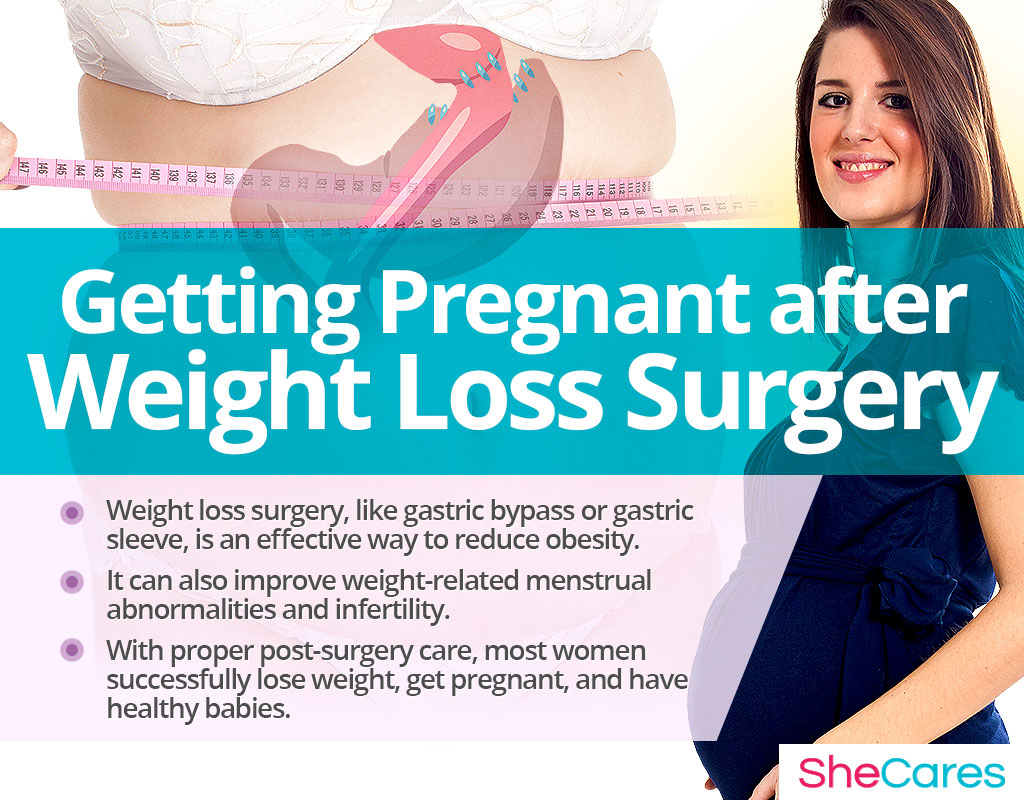Brief Overview of Weight Loss Surgery
Weight loss surgery, also called bariatric surgery, is designed to help women lose weight by making changes in their digestive tract. It is only performed on women whose BMI is above 40kg/m2, or women with a BMI of 35 who also suffer from other health problems, like heart disease, sleep apnea, or diabetes.
There are several types of weight loss surgery:
Restrictive, such as gastric sleeve, lap-band surgery, and more
Malabsorptive such gastric bypass, duodenal switch, among others
Vagal nerve blocking
Aspiration
Each of these surgeries offers different benefits, disadvantages, and weight loss rates. The choice between the different types depends on a woman's individual medical needs.
Effects of Weight Loss Surgery on Getting Pregnant
Effects on Fertility
Since obesity is a leading cause of infertility, losing weight through surgery has been shown to improve fertility by:
Resolving hormonal imbalances
Regulating menstruation
Restoring healthy ovulation
Improving egg quality
Moreover, studies have shown that bypass surgery, gastric sleeve, or other weight loss surgeries can be beneficial for women suffering from polycystic ovary syndrome (PCOS) by increasing their chances of conception.
On the other hand, since women are advised against getting pregnant immediately after the surgery, this delay in conception might cause fertility problems, especially among older women.
Effects on the Mother
Generally, a weight loss procedure might improve chronic maternal conditions, such as diabetes or hypertension, both of which are known to negatively affect a woman's health while she is expecting.
The procedure has also shown to reduce the risk of pregnancy complications associated with being overweight and obese, such as preeclampsia or gestational diabetes. It comes, however, with certain risks of gastrointestinal issues, such as internal hernias, bowel obstructions, or dumping syndrome.
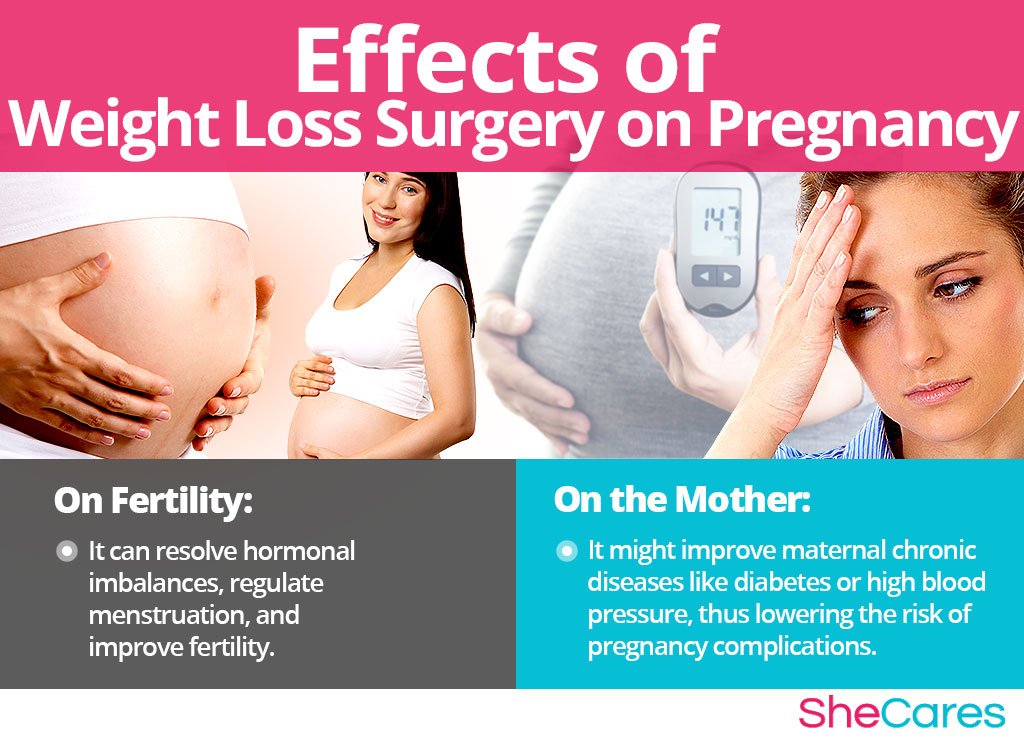
Action Plan
Following bariatric surgery, most women do not have problems with getting pregnant and go on to have safe and healthy pregnancies. However, they have a number of considerations to keep in mind before conceiving.
Months Prior to Conceiving
Your goal before getting pregnant is to optimize your nutrition and reach a stable weight. The months between your surgery and conception can greatly affect the progression of your pregnancy. So, it is worth taking the time to meet your goals as recommended by your doctor.
Monitoring
After bariatric surgery, you will be advised to delay getting pregnant for at least 12 to 18 months. This is because you will be losing the majority of your excess weight in the first 18 months after the procedure, which increases the risk of developing certain nutritional deficiencies that might prohibit you from sustaining a pregnancy.
During those months, as you continue losing weight, you will have to undergo frequent blood tests to monitor vitamin and mineral levels. A healthy diet, supplements, and other good habits will help you prevent complications.
Proper Diet
Post-surgery weight loss puts women at risk for nutritional deficiencies because their calorie intake is greatly reduced, often ranging between 500-600 calories a day, and nutrients' absorption is altered.
Consult with a licensed nutritionist to help you prepare a meal plan that suits your individual dietary needs. He or she will also help you develop new, healthy eating habits.
Your diet will change in the weeks following your surgery, slowly moving from liquid to solids foods.
Although individual recommendations might vary, most women trying to conceive are encouraged to choose the following:
Lean protein: chicken, legumes, or fish
Healthy fats: avocados, nuts, or seeds
Fruits and vegetables
Whole grains: brown rice, quinoa, or buckwheat
Supplements
To resolve potential nutritional deficiencies and prepare women for conception, you could be prescribed various supplements. They might also include standard prenatal vitamins, which have been found to decrease the risk of birth defects and complications.
- Folic acid, vitamin D, vitamin B12, iron, calcium, and copper
Hormone-regulating supplements, such as Macafem, might also be helpful in resolving hormonal imbalances, thus improving your menstruation and fertility.
Good Habits
Contraception. After a bariatric surgery, your fertility might rapidly improve. Although it is a desired effect, you should consider contraception to prevent getting pregnant too soon. Keep in mind that since oral contraceptives might not be properly absorbed by the body, their effectiveness might be compromised.
Doctor's check-ups. Losing a significant amount of weight in a relatively short period of time evokes a number of changes in your body. During the first 12 months after your procedure, you will be closely monitored by an OBGYN.
Exercise
Most women are instructed to start exercising about two months after their weight loss procedure. It has shown to aid in weight loss, boost fertility, and improve overall health. Keep the following recommendations in mind:
Start slowly and aim to exercise for 150 minutes, 5 days a week.
Focus on moderate-level, body-strengthening or cardio exercises, such as yoga, swimming, or brisk walking. Avoid strenuous physical activity as it might inhibit your fertility.
If you have excess skin after your surgery, wear loose and breathable clothing while your exercise and keep up with good hygiene.
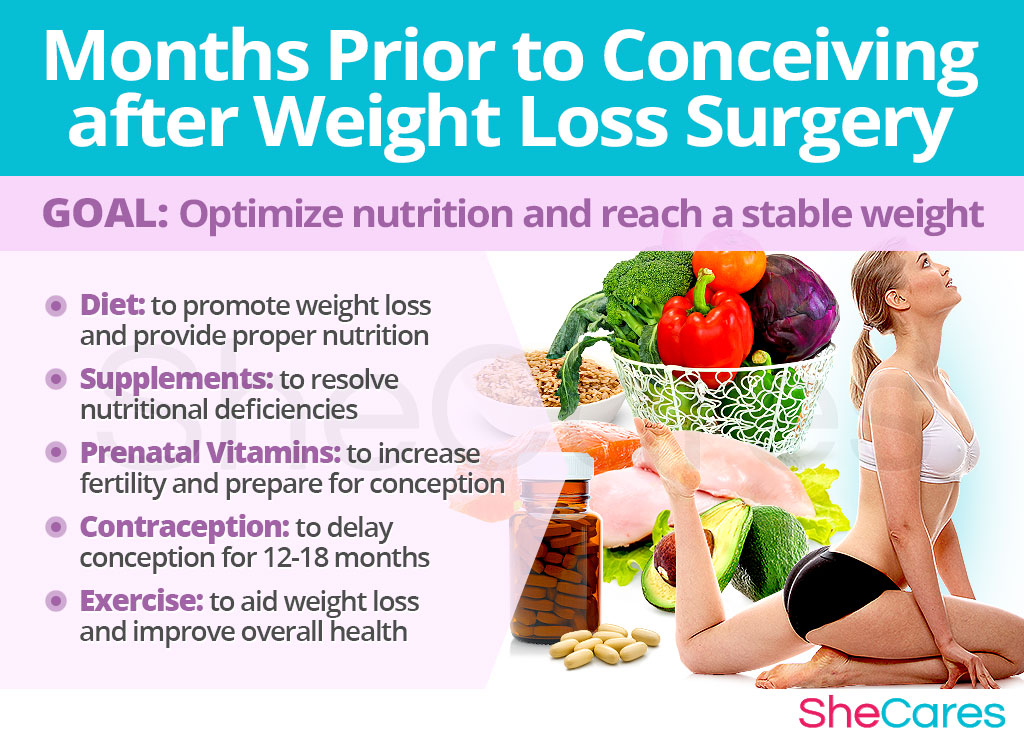
Tips for Conceiving
Once your weight stabilizes and you do not show signs of nutritional deficiencies, you will be able to start your conception efforts. Remember that sometimes it takes several ovulation cycles for couples to succeed.
Practice stress-relief techniques, such as breathing exercises or meditation.
Surround yourself with people you can lean on for emotional support.
Stay well hydrated as it improves cervical mucus and makes it more sperm-friendly.
Avoid excess caffeine as well as smoking, alcohol, and drugs.
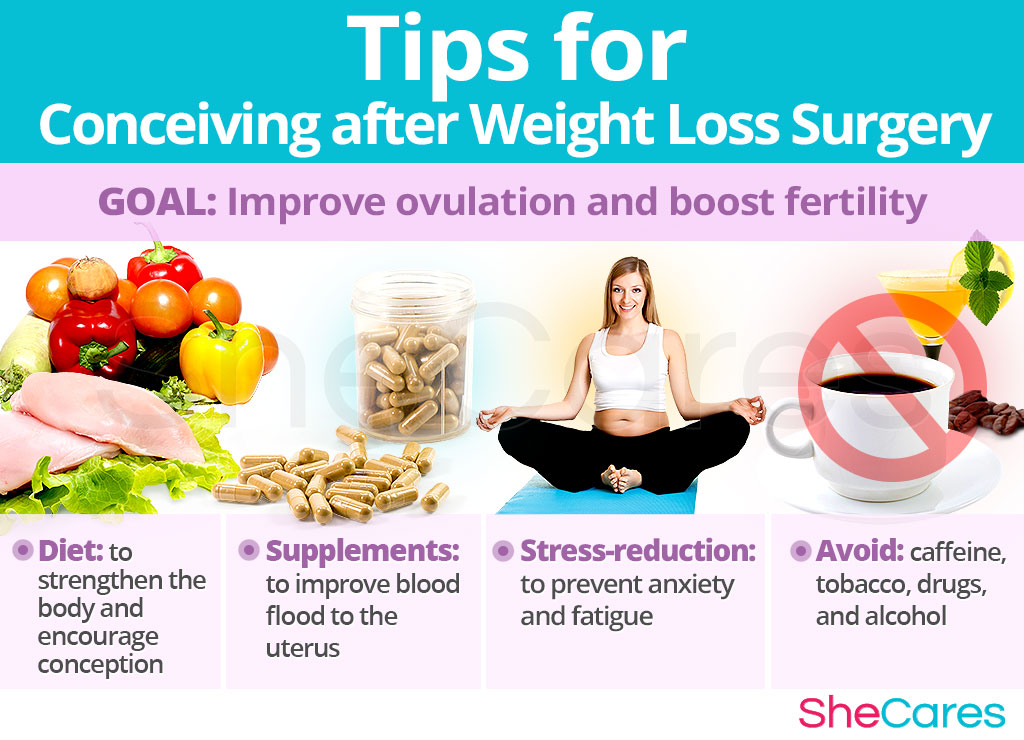
During Pregnancy
Once you get pregnant, you will continue to be closely monitored for potential complications. Consider the following:
As your pregnancy progresses, you will gain weight. It is normal and desirable in order to sustain the growing baby. However, it can become an issue for some women who had a weight loss surgery and now struggle with their body image.
Continue working with your nutritionist to create a meal plan that will allow you to gain weight slowly and within the recommended range. Seeking the help of a licensed mental professional might also be beneficial.
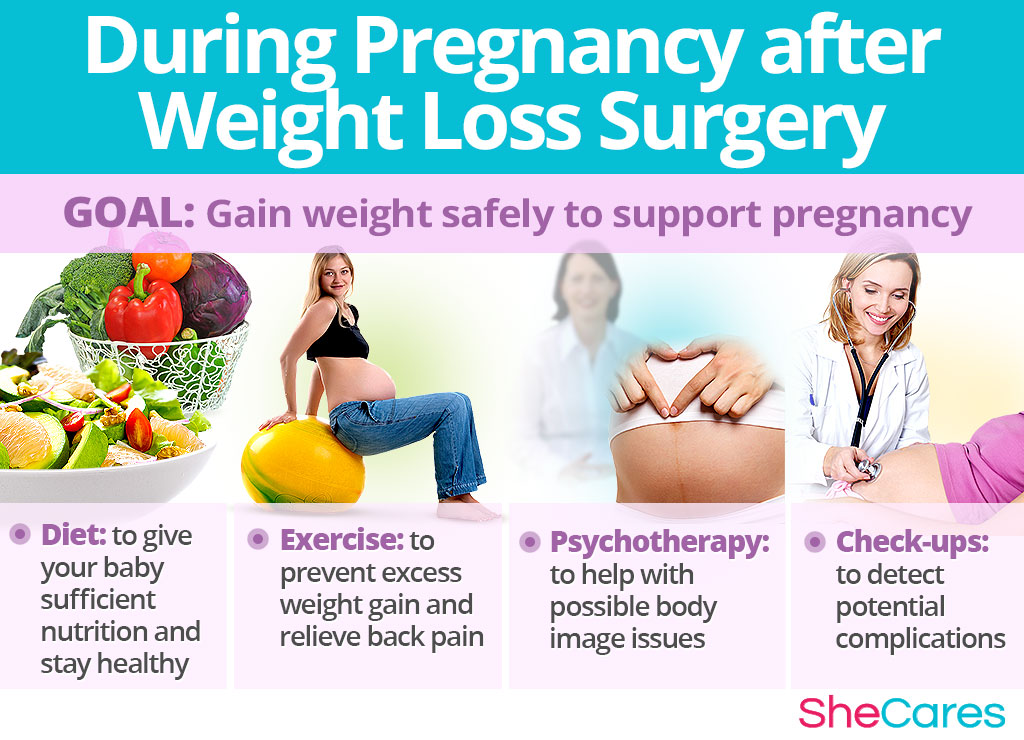
Key Takeaways
It is important to mention that although pregnancy planning after undergoing weight loss surgery is highly recommended, women who conceive sooner can still have safe pregnancies and healthy children. If you feel a weight loss surgery is not for you, check out how to prepare yourself for getting pregnant with obesity. Whichever path you take, remember that all pre-conception efforts to reach an ideal weight with diet, supplements like Macafem, and exercise will pay off once you give birth to a healthy baby without compromising your own well-being.
Sources
- American Family Physician. (2010). ACOG Guidelines on Pregnancy After Bariatric Surgery. Retrieved March 19, 2018 from https://www.aafp.org/afp/2010/0401/p905.html
- Bariatric Times. (2016). Pregnancy after Roux-en-Y Gastric Bypass. Retrieved March 19, 2018 from http://bariatrictimes.com/pregnancy-after-roux-en-y-gastric-bypass
- Evidence Report. (2008). Bariatric surgery in women of reproductive age: special concerns for pregnancy. Retrieved March 19, 2018 from https://www.ncbi.nlm.nih.gov/pubmed/20731480
- ISRN. (2013). Nutrition and Pregnancy after Bariatric Surgery. Retrieved March 19, 2018 from https://www.ncbi.nlm.nih.gov/pmc/articles/PMC3901983/
- JAMA. (2008). Pregnancy and fertility following bariatric surgery: a systematic review. Retrieved March 19, 2018 from https://www.ncbi.nlm.nih.gov/pubmed/19017915
- Journal of Maternal and Fetal Neonatal Medicine. (2012). Pregnancy and foetal outcome after bariatric surgery: a review of recent studies. Retrieved March 19, 2018 from https://www.ncbi.nlm.nih.gov/pubmed/22339055
- Journal of Obesity. (2016). Bariatric Surgery, Polycystic Ovary Syndrome, and Infertility. Retrieved March 19, 2018 from https://www.ncbi.nlm.nih.gov/pubmed/27965894
- Obesity Surgery. (2016). Pregnancy Following Bariatric Surgery- Medical Complications and Management. Retrieved March 19, 2018 from https://www.ncbi.nlm.nih.gov/pmc/articles/PMC5018021/
- Obstetrics & Gynecology. (2005). Pregnancy After Gastric Bypass Surgery and Internal Hernia Formation.Retrieved March 19, 2018 from https://journals.lww.com/greenjournal/Abstract/2005/05001/Pregnancy_After_Gastric_Bypass_Surgery_and.10.aspx
